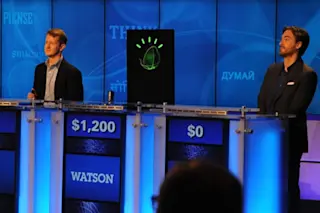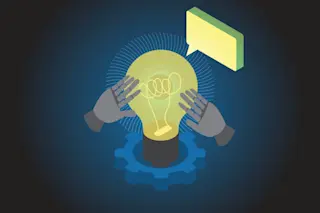Ken Jennings and Brad Rutter are accustomed to making others feel the heat as they blaze through Jeopardy clue after Jeopardy clue. But tonight, the quiz show's two greatest champions will oppose a player who can't be psyched out.
It's time for the world to meet Watson.
IBM's Jeopardy-playing computer system appears to viewers at home as an avatar of the Earth on a black screen. In fact, it is a system years in the making, and perhaps the most impressive attempt ever to create a question-answering computer that understands the nuances of human language.
Watson is not connected to the Internet, but its databases overflow with books, scripts, dictionaries, and whatever other material lead researcher David Ferrucci could pack in. Storing information is the computer's strong suit; the grand artificial intelligence challenge of Jeopardy is the subtlety of words.
When the bright lights of Jeopardy go up tonight, there ...















